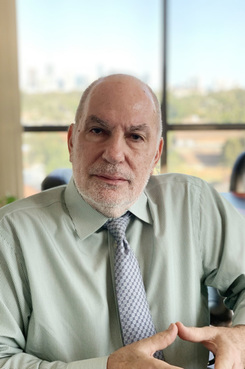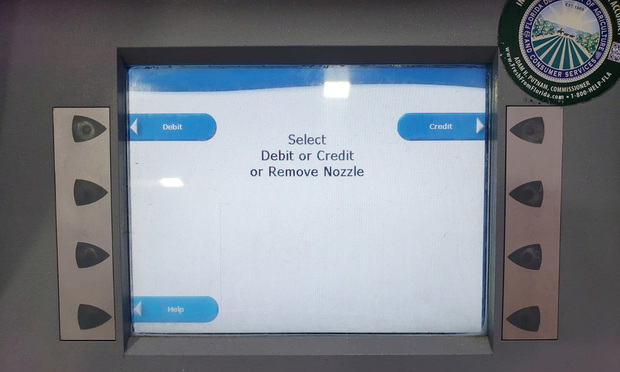Closed Captioning on Gas Pump TVs — the New Frontier of Florida's ADA Suits?
Plaintiffs attorney Scott R. Dinin said he's fielded dozens of calls about the lack of closed captioning at South Florida gas pump televisions. But is the lack of closed captioning a violation of the Americans with Disabilities Act, or a stretch?
January 17, 2019 at 02:01 PM
5 minute read
 iStockphoto.com
iStockphoto.com
Serial plaintiff Alexander Johnson has brought a federal lawsuit against a Miami gas station because it doesn't have closed captioning on the television screens beside its pumps — an issue his lawyer Scott R. Dinin said is causing dozens of callers to contact his law firm.
As Johnson suffers from severe hearing loss, he's not privy to the news and commercials streamed while consumers fill their tanks at the Chevron station on Northwest 42nd Avenue, owned by RSJ Investments. And that, Johnson's lawsuit posits, is a violation of Title III of the Americans with Disabilities Act.
The ADA was enacted more than two decades ago to curb discrimination against people with disabilities, and according to Dinin, it's outrageous that there's still so much room for ADA lawsuits in South Florida.
“This is 2019. We all know a law was passed in 1990 saying any TV has to have captions available for it,” Dinin said. ”What's going on? Why isn't there some alternative? Why aren't there captions?”
As Florida's ADA doesn't allow damages, Johnson seeks closed captioning at the gas station and reimbursement of fees and costs.
Click here to read the full complaint
 David S. Abrams of Abrams and Abrams in Miami. Courtesy photo.
David S. Abrams of Abrams and Abrams in Miami. Courtesy photo.Counsel to the gas station, David Abrams of Abrams & Abrams in Miami, agrees that businesses should abide by the ADA but argues that closed captioning on gas station TVs is beyond what the act ever encompassed.
“I've read it backwards, forwards and upside down, and I don't think that anything in the ADA … comes close to requiring video content on a gas pump be closed captioned,” Abrams said.
What's more, Abrams argued, his client doesn't have the capacity to add captions as the video content is controlled by Gas Station TV, an out-of-state media provider.
“(My client) can't punch a button, he can't pull a switch,” Abrams said. “The technology doesn't exist for him to do it.”
In response to the lawsuit, GSTV has shut down its video content on the gas pumps, according to Abrams, who said it's unclear what effect this could have on the litigation.
According to Abrams, his client won't miss the video content.
“It's not doing anything for them,” Abrams said. ”Nobody goes to a gas station because they've got good advertising on the pump.”
The station also happens to be across from Miami International Airport — not known for its quiet atmosphere.
“You can't even hear the thing even if you wanted to,” Abrams said. “The planes go 50 feet overhead.”
 GSTV's gas pump TV. Courtesy photo.
GSTV's gas pump TV. Courtesy photo.As Dinin sees it, the problem isn't just this one Miami gas station and its televisions. It's that there are still so many glaring ADA violations in Florida.
“It's not the fact that this TV right here is important if Justin Bieber is getting married or there is a snow storm coming, but what about if people don't stop this practice with all the other TVs at other places?” Dinin said.
The way Dinin sees it, not being in charge of the TVs doesn't necessarily mean the gas station can't do anything about getting closed captioning.
“It's your gas station. You bought these pumps and you allowed these (content providers) to do this,” Dinin said. “Someone's got to send a message to these companies that they've got to provide captioning, or at least the option for when people want them. Because we're living in a diverse society and the law is very clear on this point.”
 David Ferleger, left, and Brett Trembly, right.
David Ferleger, left, and Brett Trembly, right.Related story: Florida's Serial ADA Lawsuits: Long Overdue or 'Legal Extortion'?
The case is correlates with a prolonged trend in Florida, which sees thousands of ADA lawsuits every year, many filed by serial plaintiffs like Johnson.
According to electronic court records, Dinin's client Johnson has brought more than 100 lawsuits in the Southern District of Florida.
Abrams said he's pushing for a change in ADA requirements, arguing that people should give notice before filing a lawsuit, allowing businesses a short window in which to make changes and avoid unnecessary cost.
“I've been defending these for years, and I have yet to have any plaintiff or plaintiffs attorney call me up afterwards and say, 'Hey, we're going to do an inspection. Did that bathroom get fixed?' Whatever the alleged violations were, they never follow up,” Abrams said. “You throw X number of dollars at it and 'poof' it goes away.”
But Dinin is pushing for a different kind of change, incredulous that so many businesses still aren't compliant more than 20 years after the ADA was introduced.
“The practice in this area is about mental attitude,” Dinin said. “We have all the tools and resources, so it's just about attitude. But some people don't care because they don't have a deaf person or a blind person in their family or directly connected to them.”
U.S. District Judge Cecilia M. Altonaga denied the defense's motion to dismiss and ordered mediation for the parties, who will meet on March 26.
Related stories:
Winn-Dixie Urges Court to Reverse Landmark ADA Website Ruling
This content has been archived. It is available through our partners, LexisNexis® and Bloomberg Law.
To view this content, please continue to their sites.
Not a Lexis Subscriber?
Subscribe Now
Not a Bloomberg Law Subscriber?
Subscribe Now
NOT FOR REPRINT
© 2025 ALM Global, LLC, All Rights Reserved. Request academic re-use from www.copyright.com. All other uses, submit a request to [email protected]. For more information visit Asset & Logo Licensing.
You Might Like
View All
University of Florida Drops Title IX Investigation Against Basketball Head Coach
2 minute read


Top Governor's Office Executives Drafted Letters Threatening Florida TV Stations Over Abortion Ads
3 minute readTrending Stories
- 1Will Big Law's Bet on the Middle East Pay Off?
- 2Jury Awards $3M in Shooting at Nightclub
- 3How Clean Is the Clean Slate Act?
- 4Florida Bar Sues Miami Attorney for Frivolous Lawsuits
- 5Donald Trump Serves Only De Facto and Not De Jure: A Status That Voids His Acts Usurping the Power of Congress or the Courts
Who Got The Work
J. Brugh Lower of Gibbons has entered an appearance for industrial equipment supplier Devco Corporation in a pending trademark infringement lawsuit. The suit, accusing the defendant of selling knock-off Graco products, was filed Dec. 18 in New Jersey District Court by Rivkin Radler on behalf of Graco Inc. and Graco Minnesota. The case, assigned to U.S. District Judge Zahid N. Quraishi, is 3:24-cv-11294, Graco Inc. et al v. Devco Corporation.
Who Got The Work
Rebecca Maller-Stein and Kent A. Yalowitz of Arnold & Porter Kaye Scholer have entered their appearances for Hanaco Venture Capital and its executives, Lior Prosor and David Frankel, in a pending securities lawsuit. The action, filed on Dec. 24 in New York Southern District Court by Zell, Aron & Co. on behalf of Goldeneye Advisors, accuses the defendants of negligently and fraudulently managing the plaintiff's $1 million investment. The case, assigned to U.S. District Judge Vernon S. Broderick, is 1:24-cv-09918, Goldeneye Advisors, LLC v. Hanaco Venture Capital, Ltd. et al.
Who Got The Work
Attorneys from A&O Shearman has stepped in as defense counsel for Toronto-Dominion Bank and other defendants in a pending securities class action. The suit, filed Dec. 11 in New York Southern District Court by Bleichmar Fonti & Auld, accuses the defendants of concealing the bank's 'pervasive' deficiencies in regards to its compliance with the Bank Secrecy Act and the quality of its anti-money laundering controls. The case, assigned to U.S. District Judge Arun Subramanian, is 1:24-cv-09445, Gonzalez v. The Toronto-Dominion Bank et al.
Who Got The Work
Crown Castle International, a Pennsylvania company providing shared communications infrastructure, has turned to Luke D. Wolf of Gordon Rees Scully Mansukhani to fend off a pending breach-of-contract lawsuit. The court action, filed Nov. 25 in Michigan Eastern District Court by Hooper Hathaway PC on behalf of The Town Residences LLC, accuses Crown Castle of failing to transfer approximately $30,000 in utility payments from T-Mobile in breach of a roof-top lease and assignment agreement. The case, assigned to U.S. District Judge Susan K. Declercq, is 2:24-cv-13131, The Town Residences LLC v. T-Mobile US, Inc. et al.
Who Got The Work
Wilfred P. Coronato and Daniel M. Schwartz of McCarter & English have stepped in as defense counsel to Electrolux Home Products Inc. in a pending product liability lawsuit. The court action, filed Nov. 26 in New York Eastern District Court by Poulos Lopiccolo PC and Nagel Rice LLP on behalf of David Stern, alleges that the defendant's refrigerators’ drawers and shelving repeatedly break and fall apart within months after purchase. The case, assigned to U.S. District Judge Joan M. Azrack, is 2:24-cv-08204, Stern v. Electrolux Home Products, Inc.
Featured Firms
Law Offices of Gary Martin Hays & Associates, P.C.
(470) 294-1674
Law Offices of Mark E. Salomone
(857) 444-6468
Smith & Hassler
(713) 739-1250






